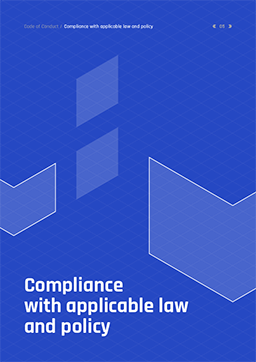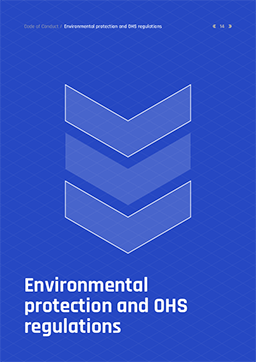Code of Conduct
Dear Employees and Contractors!
We are living in the times in which the society is systematically raising the standards. A company is expected to better respect principles and comply with a constantly growing number of business norms and legal requirements. Some companies find it very difficult to meet those requirements.
This „Code of Conduct of DSM Sp. z o.o.” (hereinafter the ‘Code’) establishes basic ethical and legal standards which we shall follow in our daily conduct. In the text of the Code we will refer to ‘our common obligations” which shall be understood as collective responsibility for implementing those top-level ethical and legal standards in practice.
The foundation of the Code shall be based on essential values underlying all aspects of our company’s activity. They include:

manufacture and supply of good quality industrial valves

being a valued employer

care for environment during the production process
We take every effort to facilitate it for everyone to speak openly, we also provide various possibilities for asking questions or reporting problems. One can even pass information anonymously. We promise that no one who asks a question or reports a problem will ever face any harassment.
We have no doubts that thanks to our joint efforts, DSM Sp. z o. o. (hereinafter DSM) will be a company working for which can be a reason to be proud of.
Management Board of DSM Sp. z o.o.
Poznań, January 2018.

01 Introduction
DSM Sp. z o.o. is committed to pursue its strategic and business goals by acting in compliance with ethical and legal standards. The image of DSM Sp. z o.o. depends on the conduct of each employee. Inappropriate conduct of one employee may have a significant negative impact on the reputation of the entire company. The employees are obliged to respect various cultures, laws, people and institutions acting in the countries in which the company carries out its sales.
The purpose of this Code is to establish the norms of conduct for all employees of DSM. Obviously, the Code does not define all possible situations which may be faced by the employees, but it includes the basic principles which should be followed by them when performing their obligations. The principles shall be also adjusted to the regulations binding in a given country. In all situations where the requirements of the Code appear to be insufficient or unclear, the employees shall use common sense and good judgment of the situation, and consult their superiors who will advise them how to behave in a given situation.
The employees are expected to behave in consistence with the letter and the spirit of the Code. All employees, irrespective of the position they hold, are obliged to comply with the Code and ensure that it is not violated by their subordinates.

02 Definitions
Unless the context provides otherwise, the following terms used in this Code shall have the following meaning:
Employee(s): members of the management board, all directors and employees of the company;
Company director in charge: the managing director of DSM Sp z o.o. member of the management board, sales director or another person holding a managerial position. People in charge of the company who belong to the management staff and supervise other employees shall bear particular responsibility for complying with the Code. They are the ones who are often the first level to which employees address problems. It is extremely important that they are ready to listen carefully and take appropriate steps. Subordinate employees observe their conduct very carefully. For our culture of ethical and principled conduct, there is nothing more important than exemplary behaviour of the management staff. Those people shall also ensure that the Code is complied with by their subordinates and that external entities that the employees deal with know our principles and procedures, and adjust to them.


03 Compliance
with applicable
law and policy

3.1. Compliance with applicable law
DSM undertakes to take all effort to act in accordance with applicable law and regulations in all countries where it carries out its sales. All employees are obliged to observe and act in compliance with applicable law and regulations. In their contacts with customers, suppliers, competitors or third parties, the employees must not enter into agreements that are unacceptable due to their anti-competitive or discriminative nature, or are illegal. In addition to acting in compliance with all and any laws and regulations, all employees are obliged to perform their duties maintaining business ethics and a professional attitude in all their contacts with customers, suppliers, authorities or partners.

3.2. Compliance with law on non-competition and counteracting monopolist practices
DSM complies with the principles and regulations regarding unfair competition which forbid all and any anti-competition practices and abusing a leader position in the market. All employees are obliged to act in accordance with applicable regulations regarding protection of competition and counteracting monopolistic practices

3.3. Compliance with regulations concerning insider dealings
The term ‘confidential information’ shall be understood as information regarding data, projects, transactions or processes that may affect widely understood changes. All employees who have access to confidential information the disclosure of which may result in significant changes in prices of offered products or other financial instruments of a given company, shall be obliged to comply with all and any applicable regulations regarding transactions carried out with the use of confidential information.

04 Avoiding
conflicts of
interest
A conflict of interest shall be understood here as a situation where a private interest of an employee is inconsistent with the interest of DSM. The employees are obliged to inform of any situations in which their activities conducted outside the company, their personal or financial interests may be contradictory to the interests of DSM. The employees may not participate in any business activities of DSM if their personal contacts constitute or may constitute a difficulty in making objective decisions. The employees may not have any personal interests that would be inconsistent with the loyalty and/or obligations towards DSM. The employees are obliged to perform their obligations exclusively with the aim to serve the best interests of DSM, irrespective of personal aspects or contacts. The employees shall act in accordance with the content and the spirit of this policy, and report t

4.1. Contacts with suppliers and customers
The employees shall maintain unbiased contacts with customers and suppliers, and act exclusively to the best interest of DSM. No employee may have a share in the interests of a supplier or customer. The employee shall inform the company’s director in charge if he or she, or their family member (husband/wife or member of the immediate family) holds or will hold (as a result of a donation, heritage or otherwise) a share in the interests of a supplier or a customer; the aforementioned provision shall not apply in the event that a share held constitutes less than one per cent of the shares in a publicly listed company.

4.2. Contacts with competitors
The employees may not hold shares in companies whose products are competitive to the products offered by DSM. The employees are obliged to act exclusively to the best interest of DSM. The employee shall inform the company’s director in charge if he or she, or their family member (husband/wife or member of the immediate family) holds or will hold (as a result of a donation, heritage or otherwise) a share in competitive companies; the aforementioned provision shall not apply in the event that a share held constitutes less than one per cent of the shares in a publicly listed company. The employees may not provide any services to a company that is in competition with DSM. The employee shall inform the company’s director in charge if their spouse, child or member of the immediate family provides services to a company that is in competition with DSM.

4.3. Payments, gifts and donations
Payments shall be made only after products or services have been supplied in accordance with a relevant agreement. The payments should be in a justified amount and documented in accordance with the generally accepted accounting principles. The employees may not, whether in a direct or indirect manner, offer, deliver, demand or accept any gifts, donations or other unjustified benefits in relation to conducted activities. The above provision shall not apply to offered and/or accepted special occasion gifts or invitations if they are of insignificant value and if it happens occasionally as a part of ordinary hospitality and customarily accepted business practices, on condition however that they do not breach any laws or regulations, and their influence on a decision-making process can be excluded. Offering, delivering, demanding or accepting any financial means for personal purposes shall be unacceptable. Making donations for political or social purposes shall be admissible exclusively within the limits determined by local law and in full transparency. Donations shall be approved by two people, one of which must be the company’s director in charge.

05 Dealing with company assets
The employees who have been provided with assets (tangible and/or intangible assets) being the company’s property or subject to control, shall be responsible for their proper use, protection and management. Expenditure/funds shall be treated with the maximum care. The employees are obliged to avoid any damages, unnecessary costs or other losses; the company’s property must not be embezzled.


06 Dealing with
information

6.1. Documents and reports
All conducted business transactions shall be documented in a manner consistent with the actual state of affairs, honestly and in time. In accordance with agreed procedures, generally accepted accounting principles, appropriate accounting systems, control measures and audits, the employees are obliged to care for the reliability and accuracy of our invoices, documents and reports. The requirement regarding the truthfulness of declarations made by the employees shall also apply to travel costs and other expenses.

6.2. Confidentiality, data protection and safety
All documents and another information regarding internal operations, the disclosure of which could be harmful to the company, shall be treated as confidential. They may not be delivered or disclosed to third parties and shall be protected against unauthorized use, and in particular against being accessed from outside the company. Confidential information shall include all strategic, financial, technical or business information not disclosed to the public, such as administrative procedures and processes, organizational issues, know-how, strategic plans, costs, products being developed, employees, customers, suppliers, marketing activities, sales and prices. The above provision shall also apply to documents and information delivered by third parties. Confidential information may be disclosed only when this is required by law or when this has been approved for business reasons. In such situations, before the disclosure of any information, the employees are obliged to inform their direct superior or the person responsible for confidential information. People from outside the company who are provided with such information shall, prior to that, sign a confidentiality agreement. The employees who use IT systems should pay particular attention to such aspects of confidentiality as data protection and safety. The responsibility for information safety management shall lie with the company director in charge.

07 Fair employment practices
DSM undertakes to apply fair employment practices and comply with applicable labour law and employment related regulations. Under our obligations towards employees, DSM strongly objects to any discrimination, harassment or violation of employees’ dignity. DSM ensures cooperation with representatives of employees based on openness and integrity. DSM does not use any forms of forced labour and its employees have the right to terminate their employment after the lapse of relevant termination period arising from legal regulations. The employees may not be asked to deposit any cash or ID documents with the employer.


08 Environmental protection
and OHS regulations
Our common obligation includes our mutual care for safety. We must protect each other from any danger of physical injuries by strict compliance with the Occupational Health and Safety (OHS) procedures. We shall also defend each other against any discrimination or harassment at the work place. No behaviour violating those principles will be accepted. Our obligations include the care for health and safety of all employees. We are trying to establish new, high standards of the OHS in our industry. In our office we are committed to complying with official norms and legal regulations on occupational health and safety as well as with our internal regulations. We provide our employees with related training that is always adjusted to the location and type of work performed by them. The employees shall treat such training very seriously and shall closely follow the agreed OHS procedures. Those procedures shall be binding on our employees and all other people present on the premises of our company. All problems and doubts regarding the OHS may be reported by the employees to their direct superiors. If you witness any behaviour that violates the OHS procedures or may, for other reasons, pose a danger, you must SPEAK ABOUT IT OPENLY! We attach great importance to preventing alcohol and/or abusive substances from appearing in our company. Employees who come to work under the influence of alcohol or drugs are a source of danger for others and for themselves. The said principle shall apply to all employees on the premises of the company as well as in any other place where they perform their work. Obviously, no instances of possession, distribution, sale or production of illegal abusive substances during work or within the premises of the company shall be tolerated. The company undertakes to comply with applicable environmental law, norms and requirements as well as to implement longterm strategies aiming at the prevention of environmental pollution and to constantly improve environmental protection related tools. The OHS regulations are an integral part of our activity. The obligation of each employee is to act in consistence with the OHS regulations, to comply with all work principles, regulations and instructions as well as to use appropriate personal protection equipment in accordance with applicable law.

09 Liability
The employees shall know relevant regulations, including this Code. Managerial Staff shall ensure that all employees are informed of applicable regulations and comply with them. In all situations where regulations of law or the Code appear to be insufficient or unclear, the employees should use common sense and good judgment of the situation as well as consult their superiors or a legal assistance department. The employees shall act in accordance with the letter and spirit of this Code. Any breach to its provisions shall not be accepted. The employees who do not comply with the provisions of this Code may face disciplinary sanctions, including termination of their employment contract.

Download the .pdf
file with out Code
of Conduct
Download the Code in .pdf
